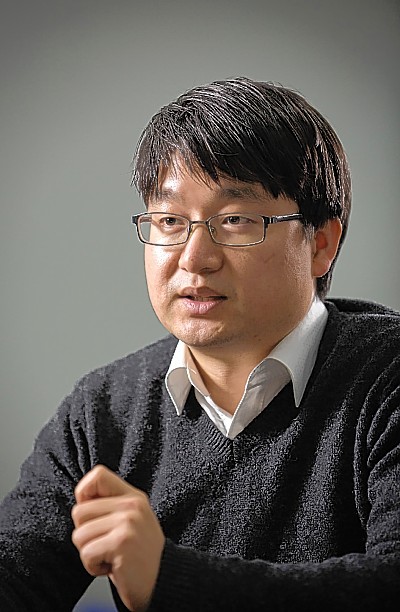Prof. Jeong-Min Baik’s Research Team, Developed Non-contact Mode Triboeletric Nanogenerator
- developed C60-functionalized Polyimide in non-contact mode triboelectric nanogenerator
- published online in Energy & Environmental Science, the world-renowned journal, in January 2021

[Image] Professor of Jeong-Min Baik (Department of Advanced Materials Science and Engineering)
Prof. Jeong-Min Baik’s research team developed C60-functionalized Polyimide in non-contact mode triboelectric nanogenerator with Prof. Chang-Deok Yang and Prof. Joon-Hee Lee’s research team at UNIST.
Triboelectric generators, which use contact electrification to convert surrounding mechanical energy into useful electrical energy when two different substances rub against each other, are used to power small electronic devices and to detect momentary stimuli in electronic skin, touchscreen, medical devices and security system.
However, physical contact between two surfaces has posed problems such as reduced out power due to material wear, need for device replacement, and noise from operation. To address these problems, non-contact mode triboelectric nanogenerators have recently emerged as an alternative, but there is a problem of decreasing electrical power as the distance between the two materials increases.
To break through the limits above, the researchers selected the carbon isotope C60 and introduced it as pendent groups into a polymer backbone developed in the previous study and give the material a high charge collection characteristic. The result showed 4.3 times higher output power and 3 times higher charge decay rate compared to perfluoroalkoxy alkane film-based TENGs.
Moreover, based on its excellent characteristics, the researchers applied it to the world’s first a keyless electronic door lock system and a speed sensor with a tone wheel for a car, and successfully demonstrated excellent performance and device stability.
Prof. Baik said “This study can be applied not only to high-efficiency energy gaining technology but also to various ‘nontact’ sensor technology to prevent the spread of viruses, such as COVID-19, in the future.
This study was selected and supported as a follow-up to the Samsung Future Development Project and was published online in Energy & Environmental Science, the world-renowned journal, in January 2021.
※ Title : Sustainable highly charged C60-functionalized Polyimide in non-contact mode triboelectric nanogenerator
※ https://doi.org/10.1039/D0EE03057K















